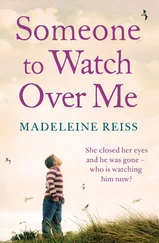Fanndís stopped and looked at the picture. She blushed slightly and rubbed her ear. ‘Yes. Lena has good taste and she always wants to look nice.’ She smiled sadly and looked away from the photo. ‘That was the last time we saw Tryggvi alive. My husband and I were on our way to the ministry’s annual ball, which was held in Selfoss, and we gave Lena permission to invite her friends to a party. I can’t begin to describe how we felt on the way home, knowing what had happened. I will never go to that ball again; I’m afraid it would stir up too many painful memories.’ She cleared her throat and let go of her ear, which was now slightly red. ‘But you don’t want to hear about that. I was brewing some coffee; it’ll be ready in a moment.’ Fanndís waited until Thóra and Matthew had taken a seat before she sat down herself. ‘Are you hungry, maybe? I can get you something to have with your coffee, if you haven’t eaten yet.’
‘No, thanks.’ Thóra was sure she was declining something delicious but the bacon was like a lead weight in her stomach and there was no way she could eat another bite. Matthew followed her lead and declined, although no doubt he could easily have eaten more.
They chatted for a few moments about the weather, then Iceland’s financial situation, but Fanndís’s comments about the situation seemed practised and carefully neutral. Thóra was impressed – she still had no idea of the woman’s real opinions by the time Fanndís decided to turn the conversation to her guests’ business. ‘I understand from Einvarður that you’re investigating the fire at the community residence. I don’t know how I can help you, but I’ll try my best.’
‘Thank you. Your husband was very generous to us and I should start by thanking you for agreeing to meet us. I understand that it’s painful to have to relive this tragic event, and the last thing we want is to cause you any distress. We’d just like your opinion on what went on at the home, in case you know something that doesn’t appear in the files.’
Fanndís pursed her lips before she spoke, but gave no other sign that she was uncomfortable with the topic. No doubt she disliked discussing private matters with strangers. ‘I don’t know what I can add to what I’ve already said. I was often at the centre and I didn’t notice anything other than that the staff did a badly paid job diligently and selflessly. I don’t really see the point in putting all my memories under a microscope in the hope of spotting some minor shortcoming.’
‘That’s not what I’m suggesting.’ It was going to be much harder to discuss things with this woman than it had been with her husband. Fanndís had immediately put up a wall, and they were unlikely to break through it without changing tactics. Getting straight to the point obviously wasn’t the way to go. ‘Your husband showed me a photo of your son this morning. He was an incredibly beautiful young man.’
‘Yes, he was.’ Fanndís glanced out of the corner of her eye at the family photograph nearest her. ‘As a newborn he really stood out from the other babies in the maternity ward. He had so much hair and he was so striking.’
‘It must have been a shock when you discovered he was autistic?’
‘Yes and no. There were definite signs from the start that we ignored. Deep down we knew that there was something fundamentally wrong, long before we admitted it to ourselves.’ The woman stared at the photo of her son as she spoke. ‘He never looked into my eyes as an infant. Even when he was breastfeeding he never looked at me. That was the first thing that struck me, although since he was my first child I didn’t know much about how they were supposed to behave. He also hardly ever cried, but we thought it was just because he was an angel. Later the symptoms became more pronounced and by the time he was ten months old we had to admit that there was something wrong with him. He didn’t make any baby noises. When we picked him up he didn’t support himself; he was just floppy, helpless. He didn’t like being touched, he didn’t try to learn to talk and he didn’t eat unless the food was put in exactly the same spot in front of him; the plate had to line up with the edge of the table and the plastic cup and spoon always had to be in the same place. I never worked out why he’d decided on this particular arrangement. Maybe I set the table like that the first time he tried eating by himself. Everything had to be the same, always. He hated change, and he often became mad with fear when something unexpected happened. His life wasn’t simple, in any case.’
‘How did he take moving to the residence? Hadn’t he always been at home until then?’
‘It wasn’t easy, but it had got better by the time the disaster happened. Moving brought so many changes that he was completely confused and he found it terribly difficult at first. We were there all the time to start with, to help him get used to it. No one knew him like we did.’ The woman looked down, agitated, and rearranged her necklace. After she’d moved it to the centre of her chest she appeared to feel better. ‘Tryggvi lived with us until he was twenty. I took care of everything for him during the daytime, apart from when he was in therapy or class; then I would take him there and pick him up. When he was offered a place at the centre, we accepted it, in the hope that it would help with his developmental therapy. It wasn’t because we were giving up or didn’t trust ourselves any longer to have him at home, as many people thought. We thought that perhaps he’d developed as much as he could under our care and that this change would help him make progress.’ She paused before continuing: ‘No one expected things to end as they did.’
‘And did he make progress? Before the fire, I mean?’
Fanndís seemed surprised by the question, which was a bit odd considering how smart she seemed. ‘No, not really, but the fire was only six months after he moved in, so he might have been about to show an improvement.’
The conversation was starting to flow now, which encouraged Thóra slightly. ‘So did he attend therapy sessions and classes at the residence? I saw that the list of employees included developmental and physiotherapists.’
‘Yes, the programme was a good one, if a bit old-fashioned for my tastes – though the director was very open to recent innovations. There’s so much happening in terms of treatments for autism that has produced excellent results but that they won’t try in Iceland, because of prejudice or some other reason, I don’t know. Still, they worked hard and I don’t want to sound ungrateful, but I would have preferred to see more ambition in such a supposedly progressive project. But of course, there was just so little experience in those who were running it.’
‘I’ve heard that the residents were rather unhappy; did you notice that?’
‘God, I forgot the coffee!’ Fanndís pressed a hand to her chest and sprung to her feet. ‘I’ll be right back.’ She hurried out of the room.
Matthew looked at Thóra in surprise.
From the kitchen came sounds of bustling activity, a cupboard door shutting and the chinking of crockery. Then they heard a voice, but it was difficult to determine if it came from a radio or whether Fanndís was speaking to someone, perhaps on the phone. Thóra listened carefully but couldn’t make out what was being said or even whether it was one or two people speaking. She noticed a framed drawing on a low bookshelf next to the sofa, which intrigued her. She had to bend down to see the drawing properly and ended up taking it from the shelf. It was obviously not the work of a known artist, since as far as Thóra was aware they didn’t tend to use crayons. So it was probably by one of the family’s children, and it wasn’t much of a leap to guess that it was Tryggvi. Thóra had no idea exactly what the artist had meant to depict, but in one corner large, clumsy characters spelled out 08 INN or something similar. The picture was too carefully drawn to be by a toddler, and the subject too peculiar. In the foreground was a figure that was probably supposed to be a person, but it had neither eyes nor nose, only a gaping mouth that appeared to be screaming silently. Behind it was a building that seemed to be the community residence, drawn roughly, which was why the picture had drawn Thóra’s attention. Although it bore a slight resemblance to the real thing there was something about it that didn’t fit, but Thóra couldn’t work out what it was that bothered her. There was also a second figure standing off to the side. Unlike the first, which was lying horizontally, this one was upright and had two eyes and a closed mouth. Its hands were raised and between them was a nearly perfectly drawn circle, divided into three sections by lines that met in the centre. There was something sinister about the figure, but it was difficult to pinpoint why; its facial features were unclear, apart from its fiery red mouth. If this was how Tryggvi had viewed people, and the world around him, no wonder he’d found life so difficult and been so afraid of change.
Читать дальше












